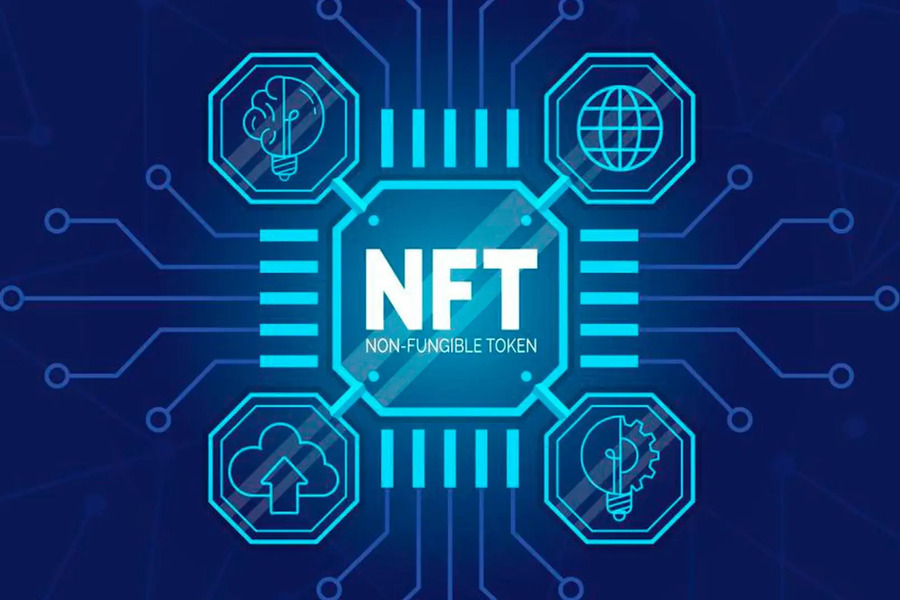
NFT Security Practices for Businesses and Enterprises
- Antwan Koss
- May 20, 2023
- NFT
- businesses, enterprises, nft, security
- 0 Comments
The rise of Non-Fungible Tokens (NFTs) has revolutionized the digital landscape, offering unique opportunities for businesses and individuals to buy, sell, and own digital assets. NFTs have gained immense popularity, attracting attention from artists, gamers, and collectors alike. However, with the growing interest in NFTs, it is crucial for businesses and enterprises to prioritize security measures to protect their valuable digital assets. In this article, we will explore NFT security practices that businesses and enterprises should consider implementing to safeguard their NFT investments.
Understanding NFTs
What are NFTs?
NFTs are digital assets that represent ownership or proof of authenticity of a unique item or piece of content. Unlike cryptocurrencies such as Bitcoin or Ethereum, which are fungible and interchangeable, NFTs are indivisible and cannot be exchanged on a like-for-like basis. Each NFT has distinct properties and characteristics that make it one-of-a-kind.
How do NFTs work?
NFTs are built on blockchain technology, typically utilizing smart contracts on platforms like Ethereum. Smart contracts enable the creation and management of NFTs, ensuring the ownership and transaction history of each digital asset are securely recorded on the blockchain. This decentralized nature of NFTs makes them resistant to alteration or manipulation.
The Growing Popularity of NFTs
NFTs in the art world
NFTs have disrupted the traditional art market, providing artists with new avenues for showcasing and selling their work. Through NFTs, artists can attach ownership rights, royalties, and proof of authenticity directly to their digital creations. This innovation has democratized the art industry and empowered artists to reach a global audience without the need for intermediaries.
NFTs in the gaming industry
In the gaming industry, NFTs have introduced the concept of true ownership of in-game assets. Players can now buy, sell, and trade virtual items, characters, and land using NFTs. This opens up possibilities for cross-platform interoperability, allowing gamers to retain ownership and value of their digital assets even when switching between games or platforms.
NFTs in the collectibles market
NFTs have also revitalized the collectibles market, allowing collectors to own and trade unique digital items. From virtual trading cards to virtual real estate, NFTs have created a new frontier for collectors to acquire and showcase their prized possessions. The scarcity and provenance associated with NFTs have added value to digital collectibles, attracting both seasoned collectors and newcomers to the space.
Security Challenges in the NFT Space

While NFTs offer exciting opportunities, they also present unique security challenges that businesses and enterprises need to address.
- Counterfeiting and forgery: Counterfeiting and forgery are significant concerns in the NFT space. Without proper security measures, digital assets can be replicated, leading to the circulation of counterfeit NFTs. Ensuring the authenticity of NFTs is essential to maintain trust and value within the marketplace.
- Unauthorized access and theft: As with any digital asset, unauthorized access and theft pose a considerable risk to NFT holders. Cybercriminals employ various techniques, such as phishing attacks and hacking, to gain unauthorized access to digital wallets and steal NFTs. Robust security measures are necessary to protect NFT investments from such threats.
- Smart contract vulnerabilities: Smart contracts, the backbone of NFTs, are susceptible to vulnerabilities and exploits. Flaws in the code can lead to the loss or manipulation of NFTs. Thorough auditing and security testing of smart contracts is crucial to minimize the risk of such vulnerabilities.
Best Practices for NFT Security
To mitigate the security risks associated with NFTs, businesses and enterprises should implement the following best practices:
- Conducting due diligence: Before purchasing or investing in NFTs, it is essential to conduct thorough due diligence. Research the creator, platform, and history of the NFT to ensure its authenticity and legitimacy.
- Working with reputable platforms: Choose reputable platforms for buying, selling, and trading NFTs. Well-established platforms with robust security measures provide a safer environment for transactions and offer better protection against fraudulent activities.
- Securing digital wallets: Secure your digital wallets with strong passwords and, if available, enable biometric authentication. Keep your wallet’s private keys offline and ensure they are stored in a secure location to prevent unauthorized access.
- Implementing multi-factor authentication: Enable multi-factor authentication (MFA) for all NFT-related accounts and wallets. MFA adds an extra layer of security by requiring additional verification, such as a unique code sent to a mobile device, alongside the password.
- Regularly updating software and firmware: Keep your devices, wallets, and software up to date with the latest security patches and firmware updates. These updates often address known vulnerabilities and enhance the overall security of your systems.
- Employing cold storage solutions: Consider using cold storage solutions for the long-term storage of valuable NFTs. Cold storage keeps your digital assets offline, reducing the risk of unauthorized access and theft.
- Auditing smart contracts: Before participating in any NFT project, conduct a thorough audit of the smart contracts involved. Engage with reputable third-party auditors who specialize in blockchain security to identify and mitigate potential vulnerabilities.
- Utilizing decentralized storage: Store your NFTs in decentralized storage systems that distribute data across multiple nodes. This reduces the risk of single points of failure and enhances the security and availability of your digital assets.
Educating Employees on NFT Security
Ensuring the security of NFTs goes beyond technical measures; it also requires educating employees about potential risks and best practices.
- Training on recognizing scams and phishing attempts: Provide training to employees on identifying scams and phishing attempts related to NFTs. Teach them to be cautious of suspicious links, emails, and messages that could compromise the security of their NFT holdings.
- Establishing strong password policies: Enforce strong password policies that include using unique, complex passwords for NFT-related accounts. Encourage employees to utilize password managers to securely store and manage their credentials.
- Encouraging cautious sharing of NFT-related information: Advise employees to be mindful when sharing NFT-related information on public platforms and social media. Oversharing details about NFT holdings can make them targets for cybercriminals.
Insurance Coverage for NFTs
As the value of NFTs continues to grow, it is crucial to consider insurance coverage for these digital assets.
- Understanding insurance options: Explore insurance options specifically designed for NFTs. Consult with insurance providers who understand the unique risks associated with NFTs and can offer tailored coverage.
- Evaluating coverage for theft and loss: Review the coverage provided by insurance policies for theft and loss of NFTs. Ensure that the policy comprehensively covers potential risks and offers adequate compensation in case of unfortunate events.
- Assessing the value of NFTs for insurance purposes: Determine the value of your NFTs accurately for insurance purposes. Engage with appraisers or experts who can assess the value of your digital assets based on factors such as rarity, provenance, and market demand.
NFT Security Audits
To ensure the integrity and security of NFTs, businesses and enterprises can consider conducting regular security audits. These audits involve a comprehensive assessment of the entire NFT ecosystem, including platforms, smart contracts, wallets, and storage solutions.
Security experts with expertise in blockchain technology can review the code and architecture of smart contracts to identify any potential vulnerabilities or weaknesses. They can also analyze the security features implemented by platforms and wallets to ensure they meet industry best practices.
Through security audits, businesses can proactively identify and address security risks, minimizing the chances of unauthorized access, theft, or counterfeiting. This demonstrates a commitment to maintaining a secure environment for NFT transactions and builds trust among NFT buyers and sellers.
Third-Party NFT Custodians
For businesses and enterprises with significant NFT holdings, employing the services of third-party NFT custodians can provide an added layer of security. NFT custodians specialize in securely storing and managing digital assets on behalf of their clients.
These custodians leverage advanced security measures, including offline cold storage, multi-signature authentication, and robust access controls, to protect NFTs from unauthorized access or loss. By entrusting their NFTs to reputable custodians, businesses can offload the burden of secure storage and focus on their core operations.
However, it is crucial to carefully evaluate and select a trustworthy custodian. Consider factors such as their reputation, security track record, insurance coverage, and the transparency of their operations. Engaging in thorough due diligence will help ensure that the custodian aligns with the specific security requirements of the business or enterprise.
Continuous Monitoring and Incident Response
NFT security is an ongoing process that requires continuous monitoring and proactive incident response. Businesses and enterprises should implement robust monitoring systems to detect any unusual activities or potential security breaches in real time.
By employing intrusion detection systems, log monitoring, and threat intelligence feeds, businesses can swiftly identify and respond to security incidents. This allows for timely mitigation measures to be implemented, minimizing the impact of potential breaches and protecting valuable NFT assets.
Having an incident response plan in place is equally important. This plan outlines the steps to be taken in the event of a security incident, including reporting, investigation, containment, and recovery. By rehearsing and regularly updating the incident response plan, businesses can effectively handle security incidents and minimize disruptions to their NFT operations.
The Future of NFT Security
The future of NFT security holds exciting possibilities as advancements in blockchain technology continue to evolve.
Advancements in blockchain technology
Blockchain technology is constantly evolving to address security challenges. Innovations such as layer-two scaling solutions, improved consensus algorithms, and enhanced privacy features are expected to bolster the security of NFTs.
Collaboration between security experts and NFT creators
Collaboration between security experts and NFT creators will play a vital role in strengthening security practices. By working together, they can identify potential vulnerabilities, implement robust security measures, and foster a safer environment for NFT transactions.
Conclusion
NFTs have revolutionized the way we perceive and own digital assets. However, as the popularity of NFTs continues to soar, businesses and enterprises must prioritize security practices to protect their valuable investments. By following best practices, educating employees, exploring insurance options, and embracing future advancements, businesses can navigate the NFT space securely and confidently.
FAQs
- Can NFTs be hacked?
No, NFTs themselves cannot be hacked. However, the platforms, wallets, or smart contracts associated with NFTs can be vulnerable to security breaches. Implementing proper security measures can help protect NFT investments. - Are NFTs insured?
Yes, there are insurance options available for NFTs. It is essential to evaluate coverage options and ensure that the policy adequately protects against theft and loss of NFTs. - What happens if I lose access to my NFTs?
Losing access to NFTs can be challenging, as blockchain transactions are typically irreversible. It is crucial to securely store private keys, enable multi-factor authentication, and keep backups to prevent permanent loss. - Are NFT transactions anonymous?
NFT transactions are pseudonymous, meaning that they are associated with a wallet address rather than personal identification. However, blockchain transactions are recorded on a public ledger, allowing for transaction analysis and potential identification. - Can NFTs be counterfeited?
While NFTs themselves cannot be counterfeited, the digital assets they represent can be replicated and sold as counterfeit NFTs. Conducting due diligence and working with reputable platforms can help mitigate the risk of purchasing counterfeit NFTs.





